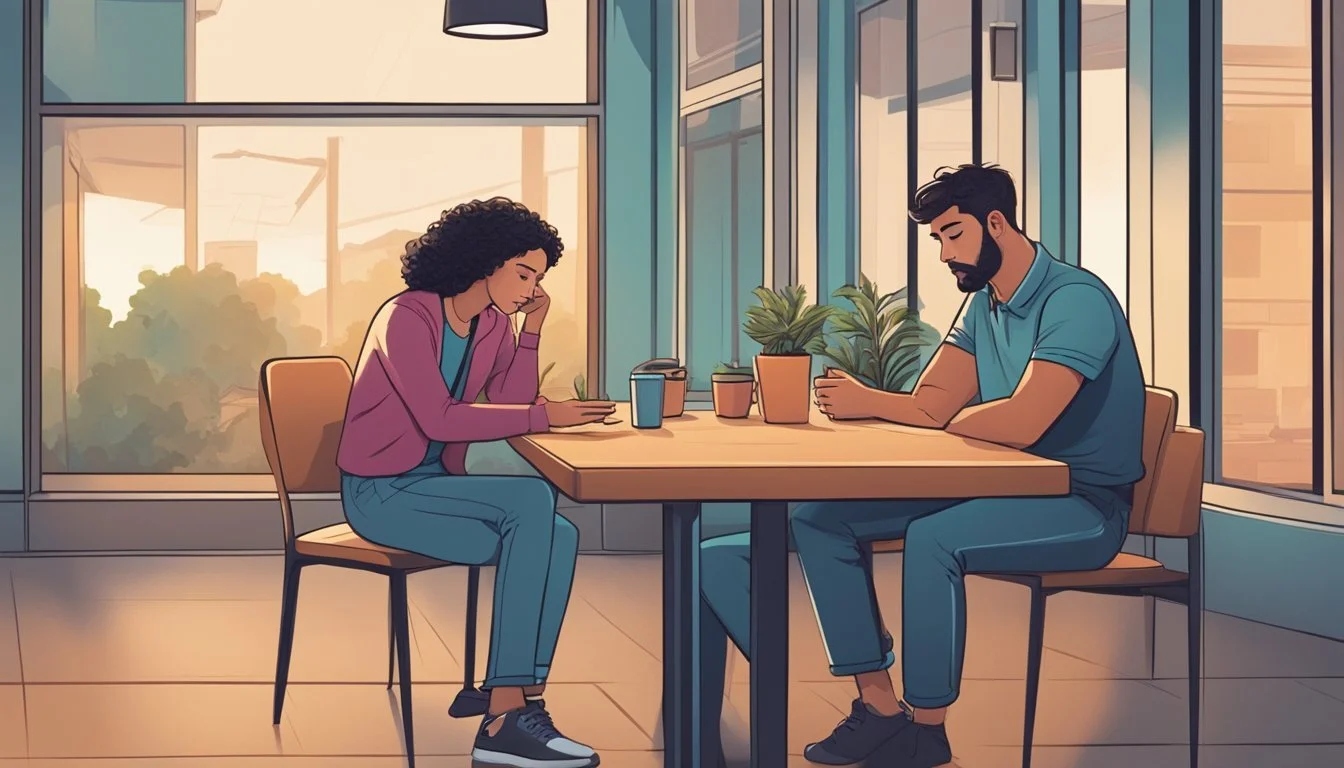7 Signs You're in a One-Sided Friendship
How to Address the Imbalance
Friendships play a crucial role in our lives, offering emotional support and companionship. Maintaining a balanced friendship is essential, but sometimes relationships can feel one-sided. Recognizing the signs of a one-sided friendship is important to ensure your emotional needs are being met.
Navigating a one-sided friendship can be challenging, as it often requires difficult conversations or decisions about the relationship. Understanding these dynamics helps you make informed choices about the connections you maintain, fostering healthier and more reciprocal relationships.
1) You Always Initiate Contact
A clear sign of a one-sided friendship is when you are the one who always reaches out.
If you find yourself consistently sending the first text, making the first call, or planning meetups, this might indicate an imbalance.
Healthy friendships involve mutual effort from both parties to maintain the connection.
Friends who are genuinely invested in the relationship will make an effort to check in as well. When this doesn't happen, it can feel draining and disappointing.
This persistent one-sided initiation can leave you questioning your friend's commitment.
Such a dynamic suggests the other person may not value the friendship as much as you do.
It's essential to recognize this pattern and understand its implications. For actionable advice, you can read more on this topic at One-Sided Friendship: 14 Signs, Effects, and Tips for Ending It.
Realizing you always initiate contact is the first step toward addressing the issue. It's important to have an open conversation about how you feel.
2) They don't make time for you.
In a one-sided friendship, it's common for one person to always feel like they're trying to fit into another’s schedule. If they consistently cancel plans last minute, it's a sign they prioritize other commitments over you.
Take note if you find yourself constantly accommodating their timeline. This imbalance suggests that your time is not valued equally.
When you try to set up meetings or hangouts, and they repeatedly show a lack of enthusiasm, it raises a red flag. Genuine friends make an effort to spend time together.
If they only reach out when they need something and disappear otherwise, it reveals their lack of interest in maintaining the bond. Emotional and social investment should be mutual.
Creating healthy boundaries is essential if you notice these patterns. Address the issue directly and observe their response.
For further insights, read more on the topic of one-sided friendships. Identifying the root of the issue can help you decide how to move forward.
3) Your problems are dismissed.
When one person constantly shares their problems, while dismissing the other's issues, it's a red flag. A one-sided friendship often involves a lack of reciprocity in emotional support.
If your friend frequently interrupts or changes the topic when you bring up your struggles, they are not valuing your feelings. This behavior signals that their concerns are more important to them than yours.
An emotionally healthy friendship involves listening and offering support. When only one person’s problems take priority, it indicates a significant imbalance.
Consider relationships where your friend brushes off your issues. If they consistently minimize your feelings or tell you it's not a big deal, your emotional needs aren't being respected.
Constant downplaying of your problems can lead to feelings of isolation. It's important for friendships to have mutual understanding and validation.
A one-sided dynamic can also manifest when your friend gives generic responses to your concerns. If they don't genuinely engage or offer thoughtful advice, it shows a lack of investment in your well-being.
Recognizing this pattern is vital. It can help you decide if the relationship is worth the effort or if it might be time to reconsider the friendship. For more insights on how to address this, check out this article.
4) You're always giving, seldom receiving.
In a one-sided friendship, one person often feels they put in all the effort without much in return. This dynamic creates an imbalance that can be emotionally draining.
When someone consistently gives support, time, or resources without receiving similar efforts, they may feel used and unappreciated.
Classic signs include always being the one to initiate contact, plan outings, or provide emotional support. Their friend might not reciprocate these gestures, leading to feelings of neglect and frustration.
Additionally, if a friend never acknowledges the help given or fails to express gratitude, it can deepen the sense of inequality.
Recognizing this pattern is crucial. It helps in understanding the true nature of the relationship. Consistently being the giver can erode one's self-worth and affect mental health.
Evaluating whether the friendship provides mutual benefit is key. If changes aren’t made, it might be necessary to reconsider the friendship’s value.
5) They cancel plans frequently.
One clear sign of a one-sided friendship is if your friend frequently cancels plans. This behavior can leave you feeling unimportant and undervalued.
When someone continuously cancels, it often means they're inconsistent in their commitment to the relationship. This may indicate a lack of respect for your time.
These cancellations might come with flimsy excuses or no clear reason at all. It can be frustrating and hurtful to feel like they don't prioritize their time with you.
Regular last-minute cancellations can also disrupt your schedule. If you find yourself always waiting or adjusting plans, it’s a red flag that the friendship may not be as balanced as it should be.
If canceling plans becomes a pattern, it might be time to address the behavior directly. Open communication about how their actions impact you can be a first step toward resolving the issue.
For more insights on one-sided friendships and how to handle them, visit Healthline.
6) They seldom support your achievements
A sign of a one-sided friendship is the lack of support for your achievements. If your friend dismisses or downplays your successes, this could indicate they don’t value your accomplishments.
They might change the subject when you share good news. Instead of celebrating with you, they might mention their issues or achievements.
Consistently experiencing this can make you feel unsupported. It's important for friends to celebrate each other’s milestones.
If your friend rarely acknowledges your efforts, your relationship may lack mutual respect. A true friend applauds your achievements and offers encouragement.
You deserve a friend who genuinely takes pride in your accomplishments and provides the recognition you deserve.
7) You feel exhausted after interactions
Feeling drained after spending time with a friend is a significant sign of a one-sided friendship. This exhaustion often stems from the emotional labor required to maintain the relationship.
In a balanced friendship, both individuals offer support and energy. When one person consistently gives more, it can leave them feeling depleted.
They might notice that conversations revolve around the other person's needs without much reciprocation. Over time, this lack of balance can lead to emotional fatigue.
If interactions leave someone feeling mentally and emotionally exhausted, it might be a signal to reassess the friendship. Constantly feeling drained can impact overall well-being, indicating that the friendship isn't mutually supportive. More information can be found on Calm Sage.
Recognizing this exhaustion is crucial. It can help in deciding whether to address the imbalance or take steps to distance oneself from the friend. There are clear and actionable steps on how to handle such situations at Healthline.
Emotional Impact of One-Sided Friendships
One-sided friendships can significantly affect a person’s mental and emotional well-being. These impacts often manifest in diminished self-esteem and a heightened sense of isolation.
Effects on Self-Esteem
When someone invests more effort into a friendship without reciprocation, their self-esteem may take a hit. This imbalance can lead them to question their worth and value in the eyes of others.
They might start to believe that their feelings and needs are not important.
Repeatedly feeling overlooked and unappreciated can reinforce negative self-perceptions. Over time, this can erode confidence and make it difficult to form new, healthy relationships.
A consistent lack of recognition from friends can also lead them to devalue their contributions. The person may start second-guessing themselves and feel less motivated to engage in social activities, negatively impacting their quality of life.
Feelings of Isolation
One-sided friendships can also lead to intense feelings of isolation. When confiding in someone who does not reciprocate, it can feel like talking to a wall, leaving emotions unaddressed.
This unreciprocated effort can heighten feelings of loneliness.
These friendships often result in the individual withdrawing from social interactions. The constant emotional effort without return makes them hesitant to initiate new connections.
They may also feel disconnected from social groups, perceiving themselves as outsiders.
Eventually, this isolation can lead to more severe mental health issues such as depression or anxiety. Being socially isolated diminishes emotional support systems, making it harder to cope with stress and challenges.
In this way, one-sided friendships can have a profound and lasting impact on an individual's mental well-being.
Strategies for Addressing One-Sided Friendships
Addressing a one-sided friendship requires clear communication and setting healthy boundaries. These strategies can help balance the relationship and ensure both parties feel valued and respected.
Communicating Your Needs
Open and honest communication is crucial in any relationship. He should express how he feels without blaming the other person. Specific examples can help illustrate the issue.
Using "I" statements, such as "I feel hurt when I always initiate contact," makes it less likely for the other person to get defensive. Encouraging reciprocity in the friendship can also help shift the dynamic.
She can suggest regular catch-up times or ask the friend to initiate plans occasionally. Listening actively to the friend's perspective and finding common ground can help them work through the imbalance together.
Setting Healthy Boundaries
Establishing healthy boundaries is essential for maintaining self-respect and mental well-being. They should decide what behaviors they are willing to accept and which ones they are not.
If a friend only reaches out during crises, it's important to communicate that while support is available, it's also necessary to have mutual engagement. Limiting the time or emotional energy spent on the friendship can prevent feelings of resentment.
Additionally, they may need to reduce contact with the friend temporarily or permanently if the imbalance persists. Prioritizing their own needs enables them to build healthier and more reciprocal relationships in the future.
When to Walk Away
Determining when to leave a one-sided friendship requires recognizing toxic patterns and valuing personal well-being. Specific indicators can help make this decision clearer.
Recognizing Toxic Patterns
Identifying unhealthy behaviors is crucial. For example, when one person consistently makes all the effort, like initiating contact or making plans, it signals imbalance. Neglect from the other side may indicate a lack of interest or respect.
Toxic patterns also include feeling emotionally drained after interactions. If the friendship often leaves one party feeling anxious or unimportant, these emotional effects should not be overlooked. Continuous criticism or put-downs also point to a one-sided dynamic.
Another toxic sign is when the friend only appears in times of need, constantly taking without reciprocation. Such behaviors indicate selfish motives and a lack of genuine care. Recognizing these signs helps in making an informed decision about ending the friendship.
Prioritizing Your Well-Being
Prioritizing self-care is essential in these situations. If the friendship negatively impacts mental health, it is worth reassessing its value. An unequal friendship can contribute to stress, anxiety, and diminished self-esteem.
Time and energy are also critical factors. Spending excessive time nurturing a one-sided friendship can detract from other meaningful relationships. It allows one to invest energy in balanced, supportive connections that foster mutual growth.
Walking away involves setting boundaries that protect one's emotional and psychological health. It means accepting that some relationships do not contribute positively to one's life. This mindset supports healthier and more fulfilling interactions.




